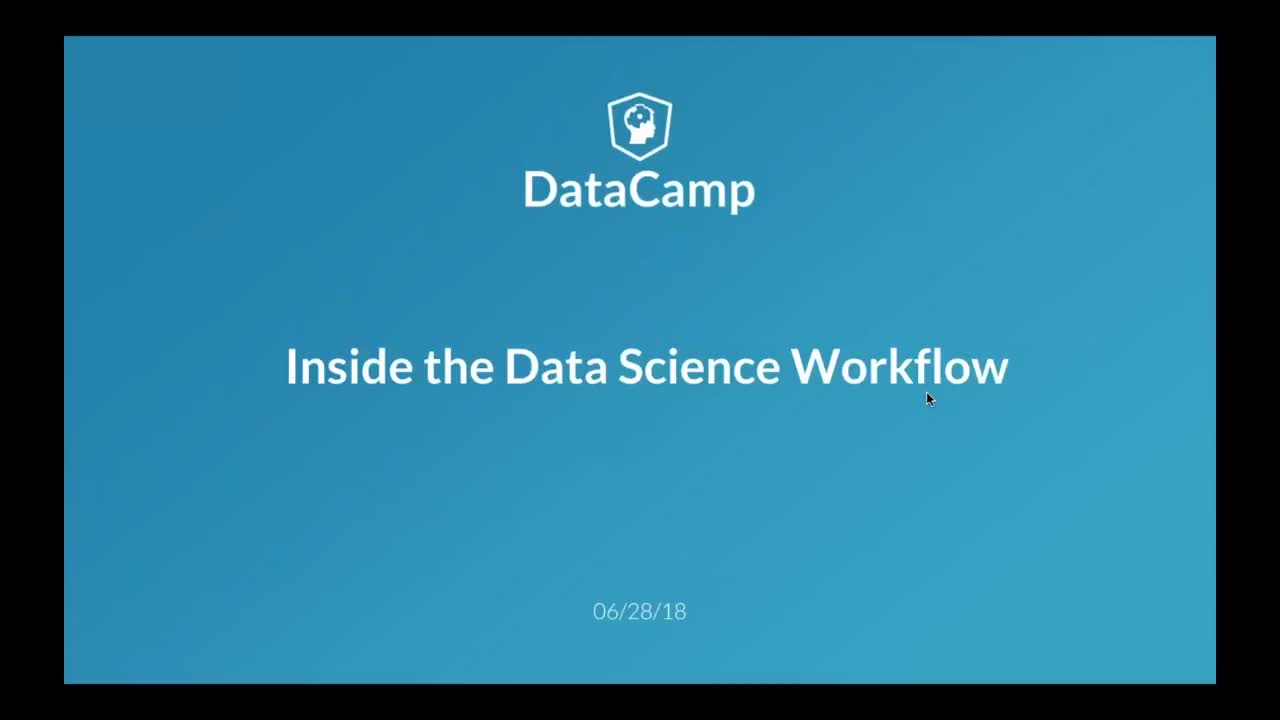Palestrantes
Treinar 2 ou mais pessoas?
Dê acesso à sua equipe à biblioteca completa do DataCamp, com relatórios centralizados, tarefas, projetos e muito mais.Inside the Data Science Workflow
November 2021
Summary
In a thorough exploration of the data science process, Hugo Bowne Anderson, Data Scientist at DataCamp, unfolds the intricate procedures that define data science. He underscores the importance of understanding the true role of a data scientist: someone who uncovers insights while working with large datasets. The session explores the transformative impact of data science across various industries, from tech giants like Google and LinkedIn to sectors such as agriculture and government. Anderson explains the important steps of the data science process, from collecting and cleaning data to modeling and interpreting it. He emphasizes the importance of organizing data for effective analysis and the iterative nature of the process, which often requires revisiting earlier steps. The discussion also mentions the hierarchy of data science needs, stressing the necessity of a solid data foundation before exploring advanced AI and machine learning applications. Throughout the webinar, Anderson shares insights from his experiences and DataCamp's educational offerings, which aim to equip aspiring data scientists with the skills needed to work in this changing field.
Key Takeaways:
- Data science is an interdisciplinary field that involves extracting insights from structured and unstructured data.
- The data science process is iterative, often requiring revisiting steps like data cleaning and transformation.
- Building a strong foundation in data collection and storage is important before implementing AI and machine learning.
- Understanding the context and domain is essential for effective data analysis and decision-making.
- Data science tools and platforms, such as DataCamp, provide accessible pathways to learning and applying data science skills.
Deep Dives
Data Science Process Exploration
The data science process is a struc ...
Ler Mais
Impact of Data Science Across Industries
Data science has moved beyond its origins in the tech industry to become an influential force in diverse fields. Anderson illustrates this by highlighting how companies like LinkedIn and Google have used data science to innovate and solve complex problems. LinkedIn's use of data-driven recommendations to expand its network exemplifies early data science applications. Google's suite of data products, including Google Maps and Search, demonstrates the smooth integration of data into user experiences. Beyond tech, data science is revolutionizing sectors like agriculture, where drones capture real-time data to optimize farming practices, and government, where data informs policy and decision-making. In finance, data science aids in stock market prediction and risk assessment. The health sector benefits from analyzing patient records and predicting treatment outcomes. Anderson's insights reveal that data science is not confined to tech giants but is a transformative force across industries, enabling businesses to use data for competitive advantage and operational efficiency.
Challenges and Solutions in Data Collection and Cleaning
Data collection and cleaning are important yet challenging stages in the data science process. Anderson acknowledges the complexity of collecting data from varied sources, such as databases, APIs, and even manual entries in remote areas, as exemplified by Doctors Without Borders' fieldwork. Each data source presents unique challenges, requiring specific strategies for effective data collection. Once collected, data must be carefully cleaned to address issues like missing values, inconsistent formats, and disorganized structures. Anderson discusses the importance of "tidy data," a concept popularized by Hadley Wickham, which advocates for organizing data in a consistent format to facilitate analysis. Data cleaning involves correcting errors, handling duplicates, and ensuring data is in a usable format. Anderson highlights tools and packages that assist in this process, emphasizing the importance of investing time in data preparation to ensure the accuracy and reliability of subsequent analysis. By addressing these challenges, data scientists lay a solid foundation for meaningful insights and informed decision-making.
Educational Pathways in Data Science
As the demand for data science skills grows, educational platforms like DataCamp are playing an important role in democratizing access to data science education. Anderson highlights the diverse learning opportunities available, from courses on data importation and cleaning to advanced topics like machine learning and deep learning. DataCamp's interactive approach, which combines short instructional videos with hands-on coding exercises, allows learners to acquire practical skills efficiently. Anderson also addresses the changing field of data science careers, noting that while advanced degrees can be beneficial, they are not always necessary. Industry experience, demonstrated through practical projects and contributions to open-source communities, can be equally valuable. By providing accessible education and creating a community of aspiring data scientists, platforms like DataCamp empower individuals to pursue data science careers and contribute to the field's ongoing evolution.
Relacionado
webinar
The Path to Data Fluency
Here's how to advance through the different stages of data maturity.webinar
Make the most of your organization’s data with business intelligence
Learn how to scale data insights in your organization with business intelligencewebinar
Building Data Fluency in an Organization
Dive into the value of data fluency in an organization and how to achieve it.webinar
Data Literacy in the 21st Century
Get the low-down on what it takes to be data-literate today.webinar
Democratizing Data Science at Your Company
Data science isn't just for data scientists. It's for everyone at your company.webinar
